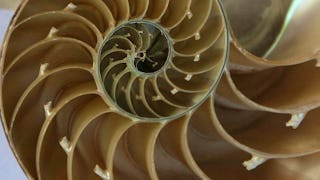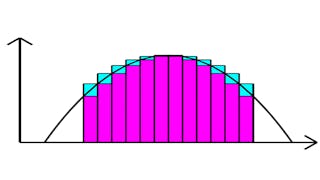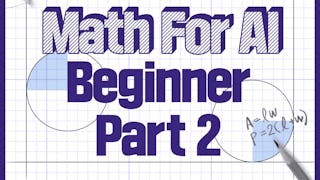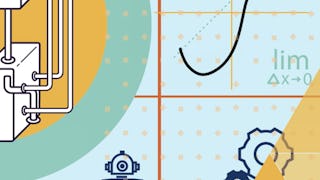This course covers both the theoretical foundations and practical applications of Vector Calculus. During the first week, students will learn about scalar and vector fields. In the second week, they will differentiate fields. The third week focuses on multidimensional integration and curvilinear coordinate systems. Line and surface integrals are covered in the fourth week, while the fifth week explores the fundamental theorems of vector calculus, including the gradient theorem, the divergence theorem, and Stokes' theorem. These theorems are essential for subjects in engineering such as Electromagnetism and Fluid Mechanics.



Vector Calculus for Engineers
This course is part of Mathematics for Engineers Specialization

Instructor: Jeffrey R. Chasnov
Top Instructor
44,238 already enrolled
Included with 
(1,376 reviews)
Recommended experience
What you'll learn
Vectors, the dot product and cross product
The gradient, divergence, curl, and Laplacian
Multivariable integration, polar, cylindrical and spherical coordinates
Line integrals, surface integrals, the gradient theorem, the divergence theorem and Stokes' theorem
Skills you'll gain
Details to know

Add to your LinkedIn profile
20 assignments
See how employees at top companies are mastering in-demand skills

Build your subject-matter expertise
- Learn new concepts from industry experts
- Gain a foundational understanding of a subject or tool
- Develop job-relevant skills with hands-on projects
- Earn a shareable career certificate

There are 5 modules in this course
Vectors are mathematical constructs that have both length and direction. We define vectors and show how to add and subtract them, and how to multiply them using the dot and cross products. We apply vectors to study the analytical geometry of lines and planes, and define the Kronecker delta and the Levi-Civita symbol to prove vector identities. Finally, we define the important concepts of scalar and vector fields.
What's included
15 videos27 readings5 assignments2 plugins
Scalar and vector fields can be differentiated. We define the partial derivative and derive the method of least squares as a minimization problem. We learn how to use the chain rule for a function of several variables, and derive the triple product rule used in chemical engineering. We define the gradient, divergence, curl, and Laplacian. We learn some useful vector calculus identities and derive them using the Kronecker delta and Levi-Civita symbol. We use vector identities to derive the electromagnetic wave equation from Maxwell's equation in free space. Electromagnetic waves form the basis of all modern communication technologies.
What's included
13 videos15 readings4 assignments
Integration can be extended to functions of several variables. We learn how to perform double and triple integrals. We define curvilinear coordinates, namely polar coordinates in two dimensions, and cylindrical and spherical coordinates in three dimensions, and use them to simplify problems with circular, cylindrical or spherical symmetry. We learn how to write differential operators in curvilinear coordinates and how to change variables in multidimensional integrals using the Jacobian of the transformation.
What's included
12 videos24 readings4 assignments
Scalar or vector fields can be integrated over curves or surfaces. We learn how to take the line integral of a scalar field and use the line integral to compute arc lengths. We then learn how to take line integrals of vector fields by taking the dot product of the vector field with tangent unit vectors to the curve. Consideration of the line integral of a force field results in the work-energy theorem. Next, we learn how to take the surface integral of a scalar field and use the surface integral to compute surface areas. We then learn how to take the surface integral of a vector field by taking the dot product of the vector field with the normal unit vector to the surface. The surface integral of a velocity field is used to define the mass flux of a fluid through a surface.
What's included
9 videos11 readings3 assignments
The fundamental theorem of calculus links integration with differentiation. Here, we learn the related fundamental theorems of vector calculus. These include the gradient theorem, the divergence theorem, and Stokes' theorem. We show how these theorems are used to derive continuity equations and the law of conservation of energy. We show how to define the divergence and curl in coordinate-free form, and convert the integral version of Maxwell's equations into differential form.
What's included
13 videos21 readings4 assignments
Earn a career certificate
Add this credential to your LinkedIn profile, resume, or CV. Share it on social media and in your performance review.
Instructor

Top Instructor
Explore more from Math and Logic
 Status: Free Trial
Status: Free Trial
Johns Hopkins University


The Hong Kong University of Science and Technology


Korea Advanced Institute of Science and Technology(KAIST)
 Status: Free Trial
Status: Free Trial
Imperial College London
Why people choose Coursera for their career




Learner reviews
1,376 reviews
- 5 stars
83.72%
- 4 stars
14.09%
- 3 stars
1.23%
- 2 stars
0.58%
- 1 star
0.36%
Showing 3 of 1376
Reviewed on Jul 24, 2020
Very good course with difficult problems. Very good instructor. Needs to provide a bit more geometric intuition to the sections involving vector integral calculus.
Reviewed on May 14, 2021
Professor Chasnov is a great instructor. I strongly recommend this course (and others from his). Thank you so much for making such great quality content available for everyone no matter where.
Reviewed on Feb 28, 2021
excellent videos; good problems; unusual to get a series of high quality notes to download. I found the final section demanding and I will need to review this section.

Open new doors with Coursera Plus
Unlimited access to 10,000+ world-class courses, hands-on projects, and job-ready certificate programs - all included in your subscription
Advance your career with an online degree
Earn a degree from world-class universities - 100% online
Join over 3,400 global companies that choose Coursera for Business
Upskill your employees to excel in the digital economy
Frequently asked questions
Access to lectures and assignments depends on your type of enrollment. If you take a course in audit mode, you will be able to see most course materials for free. To access graded assignments and to earn a Certificate, you will need to purchase the Certificate experience, during or after your audit. If you don't see the audit option:
The course may not offer an audit option. You can try a Free Trial instead, or apply for Financial Aid.
The course may offer 'Full Course, No Certificate' instead. This option lets you see all course materials, submit required assessments, and get a final grade. This also means that you will not be able to purchase a Certificate experience.
When you enroll in the course, you get access to all of the courses in the Specialization, and you earn a certificate when you complete the work. Your electronic Certificate will be added to your Accomplishments page - from there, you can print your Certificate or add it to your LinkedIn profile. If you only want to read and view the course content, you can audit the course for free.
If you subscribed, you get a 7-day free trial during which you can cancel at no penalty. After that, we don’t give refunds, but you can cancel your subscription at any time. See our full refund policy.
More questions
Financial aid available,

